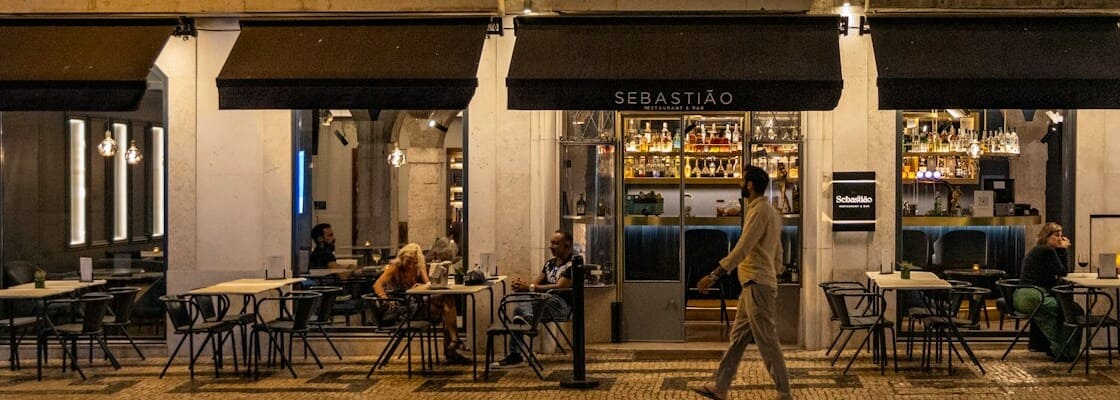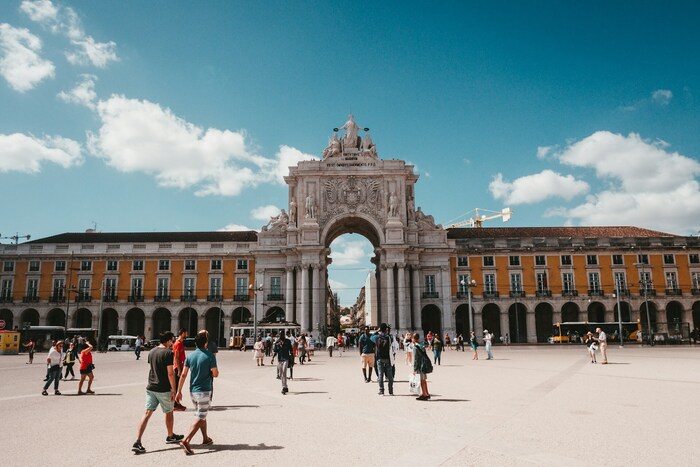A growing number of expats in Portugal are embracing the mild climate that offers over 300 days of sunshine annually, rich history and culture, picturesque beaches, and a relaxed pace of life in this stunning country located in Western Europe.
Portugal is fast becoming a popular destination for digital nomads, retirees, and families looking to begin a new chapter of their lives abroad. It is also known to have one of the lowest living costs compared to other Western European countries.
In this essential guide to living in Portugal as an expat, we will explore the pros and cons of living in Portugal and share all the practical information that you need to consider before beginning your journey towards acquiring a residency permit and living in Portugal.
Why are expats moving to Portugal?

Portugal is an attractive destination for expats, from the beautiful beaches with stunning cliffs and landscapes to the vibrant cities that tell the story of the rich history and culture this EU country is celebrated for.
In addition to Portugal’s warm climate, affordable cost of living, incredible cuisine, and laid-back lifestyle, Portugal also stands out due to the fact that Portuguese society is known for its welcoming Portuguese people and colorful culture.
With a total population of well over 10 million according to the Portuguese National Statistics Institute, which includes Portuguese and other EU citizens living in Portugal, there is no wonder that the EU country also ranks 13th for affordable cost of living, sustainable development, and overall happiness, according to the Global Citizen Solutions Quality of Life Index.
Many expats living in Portugal have also relocated to the country’s sunny shores because it is one of the safest countries in the European Union and the world. In 2024, Portugal ranked 7th in the Institute for Economics and Peace (IEP) Global Peace Index, which measures the stability of a country’s economy and the peacefulness of each nation worldwide.
The Portuguese Chamber of Commerce in the UK recently revealed that the expat population grew to 1.4 million in 2023, accounting for almost 10 percent of the Portuguese population. It was also reported that a record number of 329,000 residency permits were granted by Portugal’s integration, migration and asylum agency AIMA in 2023.
Exploring the Pros and Cons of Living in Portugal as an Expat

American and British citizens, as well as other expats from across the globe, are drawn to more than the warm climate, beautiful, secluded beaches, and rich history and culture this remarkable European Union country offers.
Portugal is an EU country known for its safety and political stability, affordable quality of life, and laid-back lifestyle. In the sections below, we will explore the pros and cons of living in Portugal for non-EU citizens.
The Pros of living in Portugal
Here, we explore the main advantages that make Portugal an attractive option for expats worldwide.
Safety and low crime rate
Safety and security are key factors that attract expats to Portugal. In 2024, Portugal ranked 7th on the Global Peace Index, reaffirming that the country has a stable political system and a low crime rate and is widely recognized as a safe destination for both Portuguese residents and tourists.
English is widely spoken in Portugal, and Portuguese citizens are known for their friendliness. In 2023, Portugal was ranked the seventh friendliest country in the European Union according to Condé Nast Traveller’s Readers’ Choice Awards, and compared to other European countries, Portugal is considered a peaceful and must-visit destination.
Portugal is one of the safest destinations for solo female travelers, according to a recent report by TimeOut, thanks to its warm culture and low crime rates.
Pleasant climate and weather
Portugal’s year-round sunshine and warm climate are two of the most significant advantages of living in Portugal, whether you decide on living in Lisbon, one of the stunning Algarve coastal areas, or in Porto, along the Douro River.
While the climate does vary from region to region, Portugal’s overall climate is quite warm. For instance, in the capital city of Lisbon December to January are considered to be the coldest months when temperatures reach lows of 8 degrees Celsius (46 degrees F) and highs of 15 degrees Celsius (59 degrees F).
In Porto, the December to January period experiences colder weather, where temperatures reach lows of 6 degrees Celsius (42 degrees F) and highs of 14 degrees Celsius (57 degrees F).
Portugal’s warmest season is between mid-June and late September, with daily average temperatures exceeding 25 degrees Celsius (78 degrees F). These are also the sunniest and busiest months in the country and are the perfect time to soak up the sun on the beach or for sightseeing.
The fall period between September and October also offers pleasant weather and less crowds and tourists in popular areas.

Affordable cost of living
Another advantage of living in Portugal as an expat is the affordable cost of living, especially when compared to other Western European countries. As with any country across the globe, your living expenses will vary depending on your location and lifestyle.
However, Portugal’s living costs are significantly lower, and you will be able to find groceries, rent, and other day-to-day expenses at more reasonable prices than in neighboring countries.
According to Numbeo, Portugal’s cost of living is 29.2 percent lower than France’s and 27.5 percent cheaper than Germany’s, excluding housing. Even when comparing Portugal to Spain, living costs in Spain are 4.4 percent higher.
Additionally, the cost of living in Lisbon is 40.1 percent lower than it is in Washington, DC (excluding rent), and rent prices are 50.1 percent lower, according to Numbeo.
Although individual financial circumstances and lifestyle choices will affect overall expenses, most people find that Portugal offers a high quality of life at a fraction of the cost seen elsewhere in Europe. By carefully monitoring spending habits, you will be able to enjoy an affordable lifestyle without sacrificing quality and comfort.
Expat Portugal: Large international communities
There is not just one best place to live in Portugal for expats, and the country’s welcoming environment and large expat communities can be found in major cities like Lisbon, Porto, and the scenic Algarve region making these areas top choices for any expat living in Portugal.
English is widely spoken, which makes communication easy for those not fluent in European Portuguese. The country offers a relatively low cost of living, excellent healthcare, and affordable health insurance, all supported by modern infrastructure.
In addition to being a secure country, Portugal offers endless entertainment and recreational activities. Whether swimming in the Atlantic Ocean, hiking in the mountains, or exploring historical castles, expats will never run out of things to do.
Activities such as yoga and tennis classes provide great social opportunities in places like the Algarve. Expats are drawn to Portugal not just for its lifestyle but also for its ease of travel and access to public transportation, which makes getting around the country convenient.
Major cities like Lisbon and Porto offer opportunities to meet fellow expats through meetup groups, Facebook communities, and city events. The Algarve region is trendy for retirees earning a passive income and looking to enjoy a laid-back lifestyle. At the same time, digital nomads are attracted by the chance to do remote work for international companies in a beautiful and peaceful environment.
Portugal’s blend of culture, modern amenities, and expat-friendly communities has helped the country earn its reputation as one of Europe’s best tourism destinations and a favorite place for many expats to call home.

Quality education and healthcare systems
Both public and private healthcare systems are highly regarded. Public hospitals provide free medical care to Portuguese citizens and residents who are registered with an SNS number through the Portuguese public health system Serviço Nacional de Saúde (SNS). It is important to note that some medical procedures and specialist visits may require a co-payment.
Besides being a safe country to live in, Portugal’s healthcare system ranks highly when compared to other European countries. It is 14th on Numbeo’s 2024 Health Care Index, ahead of notable countries like Germany and Switzerland.
Private health insurance options allow for faster service and access to better facilities, with various packages covering a substantial portion of medical expenses. The combination of affordable medical costs and high life expectancy adds to the attractiveness of the healthcare system in Portugal.
Once you enter Portugal as an expat and eventually become a Portuguese and EU citizen, you can apply for a European Health Insurance Card, which will make you eligible for medical services in Portugal and other EU countries as an expat.
Portugal also offers an excellent education system with recognized degrees across the EU, which opens up career opportunities throughout Europe. The country ranked 34th in CEO World’s 2024 survey of the best-performing education systems, outperforming Italy, Spain, and Malta.
Many university courses are available in both Portuguese and English, although English-taught programs are more costly. Furthermore, Portugal has consistently ranked high in English proficiency, coming 8th in Education First’s 2023 global rankings.
Portugal has many public, private, and international schools. There are also a number of online and on-site schools where you can take Portuguese language courses if you would like to become more proficient in the local language.
Portugal’s quality education and healthcare systems make it a top choice for expats and their family members seeking a well-rounded lifestyle.
The Cons of living in Portugal
As it is when moving to any country, there are potential drawbacks to keep in mind when you’re moving to Portugal. We explore the cons of living in Portugal in more detail in the sections below.
Portuguese bureaucracy and administrative challenges
Navigating Portuguese bureaucracy can be a challenge for expats moving to Portugal, including American and British citizens and other non-EU citizens.
Whether you need to apply for a residence permit or register to pay taxes, the process often moves slowly, appointments can be challenging to secure, and applications take time to be processed.
Additionally, many shops and restaurants close for several hours during lunchtime and are closed entirely on Sundays. For those accustomed to a quicker pace of life, these aspects of living in Portugal may be particularly challenging.
If you are patient and organized, and you bring (more than) the documents that you need as a precaution, then most processes should not be too strenuous.
Lower wages compared to other European countries
When moving to Portugal, it is essential to consider factors like the average salary relevant to your chosen profession and to take the country’s minimum wage into account.
The Portuguese minimum wage is €820 per month, which is significantly lower than that of other Western European countries.
In Belgium, the minimum wage is €2,070.48 per month, while in France, the minimum wage increased to €1,766.92 per month in January 2024, and Germany’s national minimum wage has remained fixed at €2,054 per month since June 2024.
However, it is essential to note that despite Portugal’s minimum wage being lower than other Western European countries, the cost of living in Portugal as an expat or citizen is much more affordable.
Limited availability of air conditioning and heating
Another disadvantage of living in Portugal is the limited availability of air conditioning in most homes. While the Portuguese climate varies between regions and does not have extreme seasonal changes, homes can get hot in summer and cold in winter, especially those without air conditioning or central heating, respectively.
Be sure to look into this when looking for accommodation, as you may have to rely on additional heaters to stay warm during rainy winters, for example, or invest in air conditioning to keep cool in the summer.
Navigating the language barrier
Although English is widely spoken in Portugal, learning Portuguese can be a valuable skill for American expats in Portugal. Government offices often require communication in Portuguese, and not knowing the language can make specific tasks tricky to navigate.
Additionally, if you want to immerse yourself in Portuguese culture further by ordering traditional dishes, purchasing olive oil or other delicacies at local markets, or enjoying a wine tour in the Douro Valley, using Portuguese enhances the experience.
In local markets, knowing even a basic level of the language helps with interactions, and fostering connections. Learning Portuguese might seem daunting at first, but locals often appreciate the effort and are happy to help you improve.
You can take online classes or attend one of the many private schools around the country that teach the Portuguese language.
Practical Tips for Moving to Portugal

EU and non-EU citizens moving to Portugal will need to apply for an NIF number. The NIF is a tax identification number that is required for financial transactions in the country, including setting up a Portuguese bank account, registering to pay income tax if you work for a Portuguese company, and investing in the Portuguese real estate market.
In the sections below, we will share more practical information to take into consideration for your move to Portugal.
Understanding the Portuguese Visa Process
The Portuguese government offers a range of visa options for expats from non-EU countries who want to live, work, and study in the country.
The visa options include the Portugal Golden Visa, the D3 Visa, the D7 Visa, and the D8 Visa. The Golden Visa and the D7 Visa are the most accessible routes to obtain a temporary residency visa in Portugal, both of which could ultimately lead to you and your family members obtaining European citizenship after five years of legal residence in Portugal.
Below, we will briefly explore options for entering Portugal and getting a residence permit.
Portugal Golden Visa Program
Introduced in 2012, the Portugal Golden Visa program is a five-year residency-by-investment scheme for non-EU citizens interested in moving to Portugal. The Golden Visa was created to attract foreign investors who could eventually obtain Portuguese residency and citizenship after holding legal residence for five years. The Golden Visa residence permit enables you to settle, work, and study in Portugal.
Portugal D3 Visa
Created to attract highly qualified professionals looking to work and live in Portugal, the D3 Visa allows applicants from outside the European Union/EEA/Switzerland to apply through the E-Visa Portal or the Portuguese Consulate and, if successful, work in the country on a residency visa.
Portugal D7 Visa
Also known as the passive income visa or retirement visa, the Portugal D7 Visa was created for non-EU citizens who earn a regular passive income from pensions, rental income, financial investments, or other sources. It is popular among retirees, and after five years, you will be able to apply for citizenship in Portugal.
Portugal D8 Visa
The Digital Nomad Visa, also known as the D8 Visa, is designed for non-EU citizens interested in moving to and working remotely in Portugal. With this visa, self-employed or digital nomads working remotely can obtain a Portuguese residence permit and, after five years of legal residency, can apply for Portuguese citizenship.
Our residency and migration partner, Global Citizen Solutions, offers more detailed insight into applying for a visa and securing a residence permit, as well as additional details to consider when moving to Portugal as an expat.

Securing accommodation
When moving to Portugal, finding real estate in Portugal for expats and securing accommodation in the perfect neighborhood and at a good price is an important step. Below, we will explore the difference between renting and buying property in Portugal as an expat and give you an overview of the best neighborhoods for expats to live in.
Renting versus buying property
Whether you decide to rent or buy property in Portugal will depend on your circumstances and financial goals. According to Numbeo, renting a one-bedroom apartment outside Lisbon’s city center costs €998.93, while a three-bedroom apartment in the city center costs €2,678, making Lisbon the priciest city.
Porto, the second largest city in the country, is more affordable. A one-bedroom apartment outside the city center costs €833, and a three-bedroom apartment in the city center costs €1,931. Renting may be an excellent short-term option, especially for those unsure about their long-term stay.
However, for those planning to retire or relocate long-term with the intent of obtaining Portuguese citizenship, buying property could be a wise investment. In 2023, property prices per square meter were €6,009 in Lisbon, €5,835 in Cascais, and €4,296 in Porto.
With minimal restrictions for foreigners purchasing property in Portugal, homeownership can offer long-term financial benefits and potential capital appreciation as prices continue to rise.
Popular areas for expats living in Portugal
Portugal offers a variety of areas that are popular among expats, and Lisbon is a top choice for many expats. Those seeking a coastal, relaxed lifestyle often opt for Cascais, Porto, or the Algarve.
The Silver Coast, including towns like Peniche and Nazaré, also attracts many with its scenic beauty. The autonomous regions of Madeira and the Azores off mainland Portugal offer tranquil island living.
For a quieter life, towns like Figueira da Foz in the Coimbra region are also favored. Expats can enjoy both the historical and modern charm of these areas while maintaining a more affordable lifestyle than in the US. Researching and visiting these locations before making a final decision is highly recommended.

Healthcare and medical insurance for expats living in Portugal
The Portuguese healthcare system, known as the Serviço Nacional de Saúde (SNS), provides medical care at low or no cost to Portuguese residents and citizens. However, it is not entirely free, and medical bills in Portugal are generally much less costly compared to the USA and other European countries.
The SNS operates through a network of public hospitals and health centers, offering free healthcare to individuals under the age of 18 and above 65. Tourists cannot register for the SNS and need private health insurance, though emergency treatment is available.
Having private health insurance is beneficial for expats and an essential factor during your Portuguese visa application process. While the public system is sound, private health insurance ensures comprehensive coverage. Plus, you can find health insurance coverage at an average cost of around €90 per month.

Employment and work opportunities
Portugal’s job market has become increasingly appealing to expats, mainly due to its growing tourism and tech sectors. While the national minimum wage of €820 per month, as of January 2024, is lower than the European Union average, the country’s low cost of living helps compensate, making Portugal an attractive destination for those seeking work-life balance.
Expats who want to work in Portugal must register with the Portuguese tax system and obtain a tax number (NIF). Multinational companies and higher-paying jobs tend to offer more lucrative salaries, but opportunities abound across various industries.
A 2023 report by EURES, highlighted by the European Labour Authority, identifies 31 professions experiencing shortages, presenting unique work visa opportunities for skilled professionals.
Applications programmers, electrical engineers, and medical practitioners are among the most sought-after. Expats with expertise in software development, nursing, or hospitality will also find increasing demand. Portugal continues to attract expats with its vibrant culture, stunning landscapes, and professional opportunities, making it a promising destination for those looking to make the country their new home.
Why work with BE Global?
BE Global Properties is the discerning property investors’ gateway to meticulously curated properties that transcend ordinary listings. Look no further when searching for your next dream home or investment property in the Portuguese luxury real estate market.
Explore our exclusive listings and work with our experts who offer market insights for smart investment choices and exceptional customer service to ultimately find the property investment perfectly tailored for your lifestyle.
Contact BE Global Properties today and start your journey to find your global haven.
Frequently Asked Questions about living in Portugal as an Expat
What is the cost of living like for expats in Portugal?
Portugal offers a comfortable and high-quality lifestyle, and living in Portugal as an expat, you can enjoy a lower cost of living compared to other Western European countries. Essentials like rent, groceries, and daily expenses are more affordable while living costs are 29.2 percent lower than in France and 27.5 percent lower than in Germany.
Additionally, the cost of living in Lisbon is 40.1 percent lower than it is in Washington, DC (excluding rent), and rent prices are 50.1 percent lower, according to Numbeo.
How easy is it to find housing as an expat in Portugal?
Finding housing as an expat in Portugal is relatively easy, especially with the help of local real estate agents and platforms like BE Global Properties. Whether renting or buying, expats face minimal restrictions and can choose based on personal circumstances, with both options offering benefits depending on long-term goals.
What are the visa and residency requirements for expats in Portugal?
This depends on the type of Portuguese visa you are applying for and whether you are applying as an EU or non-EU citizen. However, these are generally the documents that you need to submit when you apply for the Portuguese visa:
- Two passport-size photographs
- A valid passport that extends for three months longer than the duration of your stay
- A valid travel insurance contract that covers you for the Schengen area.
- A copy of the return ticket, depending on your nationality
- Flight dates and time
- Accommodation proof for the duration of your stay
- Proof of sufficient funds in your bank account for your duration of stay
- Proof of economic status.
- Proof of civil status
- Additional documents that will depend on your reason for the visit
Is healthcare in Portugal accessible and affordable for expats?
Healthcare in Portugal is accessible and affordable for expats. In Portugal, medical bills are significantly lower than in the USA and reasonably comparable to those in other European countries. The public system offers good care, but private health insurance provides comprehensive coverage at an average cost, some of which you can find for a fee of €90 per month.
How challenging is it to learn Portuguese as an expat?
Learning Portuguese as an expat can be challenging initially. However, there are a number of online classes and private schools offering Portuguese language classes across the country. There are also ample opportunities to learn Portuguese and develop your skills and integrate more smoothly into the community and Portuguese culture. Locals generally value your effort and are supportive in helping you improve.
What are the best cities in Portugal for expats to live in?
So, where do expats live in Portugal? Lisbon and Porto are top choices in Portugal, as both cities are known for their vibrant culture and rich history. Cascais and the Algarve are also ideal for expats who prefer a coastal lifestyle. Portugal’s Silver Coast towns like Peniche and Nazaré and the tranquil islands of Madeira and the Azores offer scenic beauty and peaceful living.
How safe is Portugal for expats?
Portugal is highly regarded for its safety, ranking 7th on the Global Peace Index in 2024. It boasts a stable political system and low crime rates and is recognized as a peaceful destination.
Are there active expat communities in Portugal?
Portugal is home to active expat communities, particularly in Lisbon, Porto, and the Algarve. English is widely spoken in the country, which makes integration easier. Many expats enjoy Portugal’s vibrant social scene, connecting with meetup groups, participating in recreational activities, and generally enjoying the high-quality, affordable lifestyle the country has to offer.
What cultural differences should expats be aware of in Portugal?
British expats and other non-EU expats living in Portugal will come across a few cultural customs to be aware of in Portugal. For instance, Portuguese people value personal space, so avoid standing too close in queues.
Even though English is widely spoken, learning basic Portuguese phrases is appreciated. Expats living in Portugal can also try to embrace local customs which can help expats build positive relationships with each different Portuguese citizen you meet.



